|
 |
|
|
Vol. 8 No. 28 WE COVER THE WORLD Thursday March 5, 2009 |
Official
On-Site Publication World Cargo Symposium Bangkok 2009 Day
4 |
WCS Focus On ULD Management
Keki Patel, Cargo Manager, India & Nepal, Emirates SkyCargo told Air Cargo News FlyingTypers that February featured flights into a growing list of ten stations, some 163 frequencies in all."Choices abound with our services into India including Ahmedabad, Delhi, Kolkata, Hyderabad, Mumbai, Bangalore, Chennai, Kozhikode, Kochi and Thiruvananthapuram. Staying close to the customer is an every day goal for us,"said Keki Patel. |
Cargo airlines that want
to save cash and improve the quality of their transports should commence managing
their unit load devices seriously.
Fact is that carriers burn up to 220 million
dollars yearly by not paying sufficient attention to their flying assets.
By doing so "this indeed could print
money for airlines," stated Bob Rogers, VP Asia/Pacific of Nordisk Aviation
Products at the ULD track held Wednesday at IATA’s Bangkok World Cargo
Symposium.
Pictures shown at the meeting exemplified
this. Heavily damaged LD3 containers that forklifts ripped off, toppled over
trolleys because of false loading, torn up nets, missing straps and dent pallets
were just a small demonstration of the shadowy existence of ULDs presented
by various speakers.
Because of damage, theft or demurrage
airlines tend to overstock their ULD fleet "up to six times the number
needed for aircraft utilization," criticized CEO James Everett of JMI
Aerospace as an enormous waste of value.
As equipment moves off airport "many
airlines still don’t know what happens with their ULDs," emphasized
the manager.
Therefore, inventory is badly needed.
"First thing you need to know is WHO has WHAT and for HOW LONG,"
he recommended.
Mr. Everett also said "those who
damage your devices you should bill. “This could save airlines as much
as 30 percent of their ULD repair costs,” Everett calculated.”
But looking back at the early days of
containers in the 1970’s, substantial weight and material improvements
have been achieved.
Bob Rogers pointed that out saying that
today more than 60 percent of modern containers weigh less than just a few
years ago, with lighter devices to come.
Air Canada’s Urs Wiesendanger and
Albert Lo of Cathay Pacific said that carriers are already utilizing a large
number of lightweight containers mainly made of composites with encouraging
results.
"Because we carry less tare weight
we reduce our fuel consumption, while increasing both our payload and operating
costs," exclaimed Wiesendanger.
However, "before you go to lightweight
make sure people can handle those ULDs," warned Joseph Chan of Hong Kong-based
ground handler Jardine Aviation Services.
Very often problems are not caused by
hardware but human factor, he said. Therefore, Jardine launched specific training
programs for supervisory level and above for airlines, ground service providers
and freight forwarders. "What’s needed to prevent damages and losses
is "a competent workforce with basic knowledge and skills," Chan
told conferees at WCS.
“What is also needed all the time
in the ULD business is a stiff regime with daily inventory checks and sudden
controls,” C.K. Ng of Hong Kong Int’l Airport said. “Are
empty containers properly stowed in designated areas, do tractors tow no more
than six trailers and does the personnel obey the speed limit of 25 km/h while
driving across the tarmac,” are questions that need answers and constant
monitoring Mr. Ng pointed out. If not it all will end up in chaos with nobody
knowing where the ULDs are.
By having imposed strict and highly transparent
rules, Hong Kong International it should be mentioned is benchmark for properly
managing the flying assets on the ground.
But chalk up ULDs as a session highlight
of Day three at WCS—professional, well attended with plenty of take
away for stakeholders to go back to their office and think about.
Heiner Siegmund
|
|
|
|
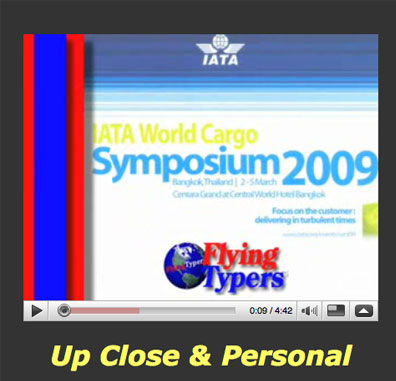 |
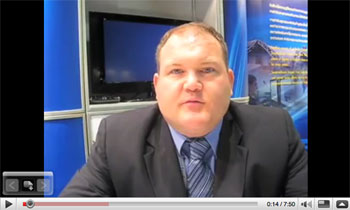 |
Click On Images To View Videos |
Vorwerk Will Build CNS
Former Lufthansa Cargo executive Michael Vorwerk had just
been appointed President of Cargo Network Services (CNS) and taken up the
reigns March 1 having made a brief appearance in Bangkok earlier this week
to a round of applause from colleagues in the packed opening sessions as Aleks
Popovich, IATA Head of Cargo introduced him.
By taking the lead at the Miami-based IATA subsidiary,
the Berlin-born manager will follow Jens Tubbesing who quit CNS in July 2008.
Michael, who spent several days this week getting
to know new people and renewing old acquaintances gave Air Cargo News
FlyingTypers an insight into his plans, motives, and visions in his first
interview after being named late last month.
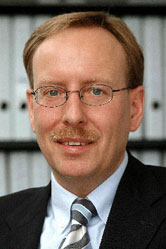 Q:
Michael, what especially enticed you to head CNS?
Q:
Michael, what especially enticed you to head CNS?
A: To start with
let me emphasize that I consider it a great privilege being appointed new
CNS President and as an integral part becoming Executive Director for Cargo
2000, the global quality management system under the patronage of IATA. Especially
in sluggish economic times with just about every player in the aviation and
logistics industry struggling because of strong and gusty head winds, this
responsibility will not be an easy task. My previous fields of activities
in forwarding and airline industry are complementing my new duty at CNS. Before
joining CNS I was Managing Director and COO of LifeConEx, a joint venture
of DHL Global Forwarding and Lufthansa Cargo based in Plantation, Florida.
Now, by soon heading CNS I appreciate the chance to broaden my spectrum by
promoting comprehensive programs and solutions within CNS and IATA for the
entire industry, and not only on behalf of a single company as before. This
perspective indeed thrills me quite a bit.
Q: When commencing
your job next March what topic ranks on top of your to-do schedule?
A: It is not one
single issue that CNS prioritizes but a number of topics that we intend to
push forward for further improving the supply chain. Take the aforementioned
Cargo 2000 that shippers, forwarders and airlines can benefit from by both
saving money and enhancing the quality of shipment flows. The result will
be a better product that our industry delivers to the customer. One of the
major tasks on our agenda is therefore, to convince more industry partners
to embrace Cargo 2000. This we intend to achieve by demonstrating case studies
that visualize typical shortcomings along the supply chain and how implementing
Cargo 2000 as a tool can avoid them. Irregularities are an unfortunate part
of the daily working routine; we need to make them transparent by systematic
measuring in order to address them with continuous improvements.
Further we have to put focus on customer requirements, which is, by the way,
the central message for this IATA World Cargo Symposium. Up to now, many supply
chain participants are doing a good job in optimizing their own processes,
which, however, does not mean, that the sum of these many efforts lead to
a perfect transportation chain. Therefore, we have to work on a new collaborative
thinking by knitting together the different industrial partners to develop
joint solutions. IATA’s WCS is an appropriate forum for discussing this
issue and presenting some encouraging quality partnership projects.
Q: Supposedly e-freight
ranks high on your agenda as well.
A: It certainly does. In the passenger business IATA was successfully able
to drive the implementation of electronic ticketing within a couple of years.
Now, in airfreight the implementation of E-Freight will not be easy because
of the complexity of the processes and the many players involved. But despite
all the challenges we are determined to push this issue ahead because it simplifies
the processes, saves money and leads to better results. Generally speaking
we have to enhance the automation of the cargo processes. There, I see a wide
field for leverage especially in economic downturns like today that inevitably
will trigger off new concepts in our industry.
Q: What will be
your first task starting day as CNS President?
A: To participate in IATA’s third World Cargo Symposium here in Bangkok.
I will be officially introduced, which gives me a good start with the opportunity
to meet many important stakeholders from a large group of industry representatives
and to learn first hand about more details of the most prevailing industry
agenda topics.
A: Good preparation
for me as well for the upcoming CNS Partnership Conference 2009 from May 3-5
in California.
Heiner Siegmund
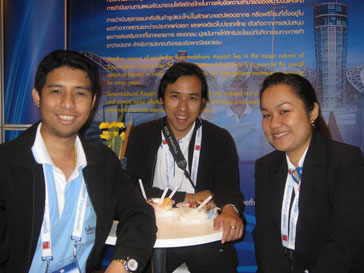 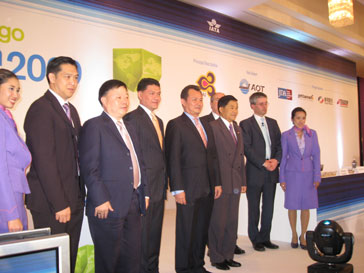 |
Conferees attending IATA World
Cargo Symposium all this week in Bangkok already know that although the lousy
business climate makes the option tempting, this is definitely no time to
duck your head in the sand.
Prediction of a continued draw down in overall
business prospects for 2009 has already exacted a toll, as travel and trade
show budgets have lightened up faster than the proverbial ice cube in hell.
No doubt about it.
Business 2009 has been impossible.
Here was an industry well on its way to a better
than alright year in 2008 when wham, bam, no thank you maa’m-air cargo
along with just about everything else slid off the charts into an ever deepening
black hole.
Put another way, if you don’t think air
cargo is in Dutch with the Duchess then you’re not paying attention.
But when you think about it, right now is exactly
the right time to get together, learn some things, network and rub elbows
with opposite numbers and maybe even expand parameters to think out of the
box while making some moves to knock off some new markets.
Better late than never we say.
Sure there will be those who say meetings such
as WCS, CNS, Trans Logistic Munich and some others are better passed up for
this year, but we respectfully disagree.
Maybe it is the scale and expense that frightens
in these tough times.
Or maybe it is the trade shows themselves.
Sure, some events are long on back patting and
curious “awards”, and other such nonsense, and some, for our money,
should be avoided like a plague.
Perhaps the real problem is that we have grown
somewhat complacent and are not looking around enough to discover what else
is out there?
For example, right here in Bangkok last September
as business was going from bad to worse some airline claims managers, risk
and insurance managers, freight forwarders, ground handlers, loss adjusters
and aviation liability lawyers gathered to discuss the air cargo claims industry.
The aforementioned group of world leaders in
cargo claims may have arrived during an air of uncertainty, but from all reports
they emerged from the two-day sessions with practical, workable solutions
and best practices gathered and presented by IATA Cargo, which could then
be shared by all.
“This is the only industry conference
of its kind which addresses the special needs of a very important, yet oft
neglected part of the industry,” said IATA Head of Cargo Aleks Popovich.
“The Thai Air Freight Forwarders' Association
(TAFA) and Thai Cargo care (Thai Airways Cargo) lent their full support for
this event.
“Air Cargo Claims were examined from the
airlines', forwarders' and the shippers' perspectives with solutions and recommendations
from each of these stakeholders.
Horst Billand and his wife Maren Mueller-Darheim
of FTS-Freight Tracing Systems & Consulting presented their unique and
very successful freight tracing service that has been saving thousands of
dollars for airlines and insurers, while Chris Catto Smith of Cool Cargo Ltd.
demonstrated how unbroken cold chain and good logistics practices can dramatically
reduce damages and claims to fresh produces.
“Their interesting cargo solutions can
truly help ensure substantial savings and dramatically reduce costly air cargo
claims payouts," said IATA’s Ajay Pande who headed up the cargo
claims effort.
“A very seasoned and experienced Claims
Manager, Arjan van der Kraan of KLM-Air France revealed why a claims manager
sometimes needs the skills of a detective and shared some very useful and
practical tips and tricks of the trade which he had mastered over the years.
“Joe Goodridge of Beaumont and Son Aviation
at Clyde & Co opened everyone's eyes with his very illuminating presentation
on "Fraud Involving Air Cargo Claims”.
There was more, including John Edwards, IATA's
Head of Cargo Security who is also at WCS ’09 Bangkok.
Mr. Edwards advised all the delegates about
the latest initiatives in the areas of Cargo Security and Loss Prevention
and the challenges ahead of him and his team.
We point to the IATA Cargo Claims Conference,
to say that although the economic landscape may have people tied up in a knot
right now, this is also a time when the advice and counsel and good ideas
of others are most needed.
It is everyone’s job to insist on quality
content and presentations that deliver speakers and panel members with something
to say.
Duke Ellington once said about musical tastes:
“If it sounds good—it is good!”
So too it is with quality presentations and
discussions at industry events.
When both are good, the quality can drive an
extremely high level of interaction between event delegates, speakers and
the panel members that in turn open up superb networking opportunities with
other colleagues in the industry.
As an industry we must demand better.
Quality presentations such as at Cargo Claims
or this week at WCS are benchmarks that need to be expanded and copied all
over the place.
Later this year IATA will conduct another Cargo
Claims Conference on September 11 & 12 in Mexico City.
But the message here is also that industry stakeholders
should endeavor to unearth transportation and other conferences of depth,
importance and unique common interest to maybe just attend as part of an effort
to unlock new business.
Maybe 2009 can be a year of discovery after
all.
Geoffrey
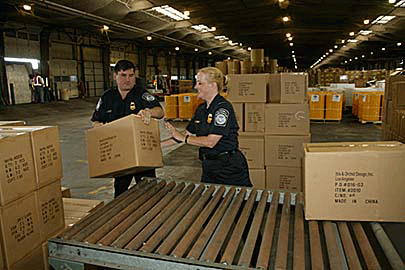 So
it has been about a month since TSA levied its 50% rule on all USA belly cargo
and a world with other problems, though not yawning at air cargo’s concerns
can be fairly described as being rather uninterested.
So
it has been about a month since TSA levied its 50% rule on all USA belly cargo
and a world with other problems, though not yawning at air cargo’s concerns
can be fairly described as being rather uninterested.
Albert Saphir who heads up ABS Consultants,
a leading USA based resource in these matters to companies all over the world
notes:
“I still see a lot of uncertainty and
confusion amongst all the players, also questions, but no interruptions or
serious delays as some had feared.
“On the physical screening side, it seems
that passenger airlines are doing the bulk of it - more and more at no charge
as they are canceling the screening fees in order not to turn cargo away.
“Also with the current declines in volumes,
I have not heard of any bottlenecks.
“Obviously shippers who changed their
packaging in advance of the screening requirement are doing fine.”
In a development some might have wished had
gone in another direction some third-party TSA approved CCSFs are left with
few options other than wait and see if business picks up because in truth
there is not much screening activities for them anywhere near the windfall
that was expected.
Right now CCSFS hope that they did not make
big investments for TSA approved screening equipment for nothing.
It certainly has been more bust than boom some
had projected. On the IAC side, the process varies considerably as well. Many
are not charging yet for screening even if they have been already approved
by TSA to do so. Others are trying to charge all customers everything and
a bag of chips to see if they can get away with it.
“Buyer beware," Albert Saphir advises.
“Other IACs are idling their screening
operations as there has not been much need or demand for them yet," he
says.
Mr. Saphir notes that questions surrounding
the "authorization forms" that had come up a few weeks ago “are
still unresolved as I have not yet seen an official announcement from TSA.
“Shippers are trying to comply as best
as they can, and IACs still have different approaches to this.
“But we continue to find out more as new
questions come up that shippers are looking to have answered.
“Understand from IACs that they cannot
provide confirmation to the shipper until the shipment is on its final leg,
so how are consignees or shippers going to know where they freight is, if
it is on-time etc.?
“We certainly understand the security
concerns, we need a safe passenger airline system.
“But are we not turning back the clock
too far?
“So what are we going to do with these
airline and IAC tracking and tracing systems?
“Just disconnect them?
“What use are they, if the information
provided is not accurate or purposely delayed.
“I am sure there are good answers to all
of this.
“But little is known, especially to the
shippers who continue to be in the dark on several matters leading up to the
100% screening mandate next year.
“We need everyone involved in this, the
TSA, IAC, passenger airlines and their customers, the shippers, to get together
and come up with good and safe practices and ensure that all are on the same
page.
“Otherwise, I do not foresee much future
for air cargo on passenger airlines in the USA.”
Also addressing another pressing issue Albert
Saphir noted:
“The TSA edict about concealing flight
details that flies in the face of an expensive legacy system of track and
trace allowing shippers to follow air cargo movement.
“No one has a problem with flight details
not being released to "unknown" (or casual) shippers, and this point
has been made clear to the TSA by IACs, shippers and associations.
“But there must be a legitimate method
for IACs to release flight details to "known" shippers, those that
have been vetted by the IAC and meet stringent TSA requirements.
“Maybe passenger airlines need to get
with the TSA as well to make their case, as we only are successful if all
can play together fairly and safely.”
www.abs-consulting.net
Geoffrey
Thanks to Emirates Airline for providing us transportation to IATA World Cargo Symposium 2009 |
|
Publisher-Geoffrey Arend • Managing Editor-Flossie
Arend • Advertising Sales-Judy Miller
Send comments and news to geoffrey@aircargonews.com
Air Cargo News FlyingTypers reserves the right to edit all submissions for
length and content.
All Cargo Media, Publishers of Air Cargo News Digital and FlyingTypers
Copyright ©2009 ACM, Inc. All Rights Reserved. More@
www.aircargonews.com